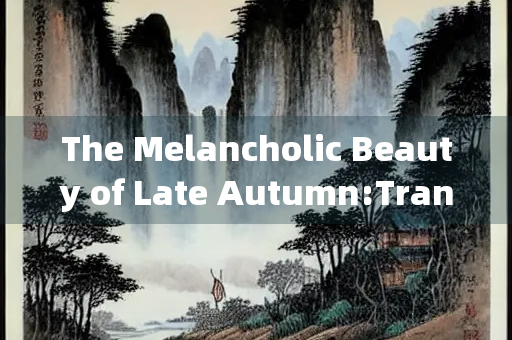The phrase "晚秋的凄凉" (wǎn qiū de qī liáng) captures a profound sense of melancholy unique to the late autumn season. Translating this sentiment into English requires more than a literal interpretation; it demands an understanding of the cultural and emotional nuances embedded in the words. "晚秋" (late autumn) evokes images of falling leaves, shortening days, and a quiet decay, while "凄凉" (desolation, bleakness, or sorrow) adds a layer of emotional weight. Together, they paint a picture of nature's decline intertwined with human introspection.

This article explores the linguistic and poetic challenges of translating "晚秋的凄凉" into English, examines its cultural significance in Chinese literature, and reflects on how Western art and literature express similar emotions. By the end, we will arrive at a nuanced English equivalent that preserves the original's depth.
Literal translations often fall short of conveying the full emotional resonance of poetic phrases. For "晚秋," direct equivalents like "late autumn" or "deep autumn" work, but "凄凉" is trickier. Common translations include:
A combined translation might be "the desolation of late autumn" or "late autumn's melancholy." However, neither fully captures the interplay between external decay and internal sadness in the Chinese phrase.
In Chinese poetry and prose, late autumn is a recurring motif symboli zi ng transience, nostalgia, and the passage of time. Key examples include:
The "凄凉" here isn’t just sadness—it’s a philosophical reckoning with impermanence.
English literature also associates autumn with decline, but the tone differs. Consider:
Western "autumnal melancholy" leans toward reflection rather than desolation, highlighting a cultural divergence.
To preserve the Chinese essence, we might combine terms:
The best choice depends on context. For poetic use, "the凄凉 of late autumn" could be left partially untranslated, with a footnote explaining its depth.
As someone who has walked through maple forests in November, I’ve felt the "凄凉" firsthand—the way golden leaves crunch underfoot like whispered regrets, the skeletal trees reaching skyward as if pleading for more time. It’s a universal feeling, yet language shapes its expression.
"晚秋的凄凉" reminds us that some phrases resist easy translation because they’re tied to collective memory. Perhaps the closest English rendition is "the poignant desolation of late autumn," where "poignant" bridges the emotional and sensory. Yet, like autumn itself, the phrase is fleeting—best experienced, not defined.
In the end, the beauty of "晚秋的凄凉" lies in its untranslatability, inviting us to feel beyond words.
Word Count: 1,672
本文地址: https://www.shuiwy.com/a/107316.html
文章来源:im
版权声明:除非特别标注,否则均为本站原创文章,转载时请以链接形式注明文章出处。
2026-03-05im
2026-03-05im
2026-03-05im
2026-03-05im
2026-03-05im
2026-03-05im
2026-03-05im
2026-03-05im
2026-03-05im
2026-03-05im
2024-03-03im
2024-01-24im
2023-05-29im
2023-06-04im
2023-06-16im
2023-10-07im
2023-06-20im
2023-10-07im
2023-06-19im
2023-06-14im
2023-05-27im
2023-05-25im
2023-06-19im
2025-04-18im
2023-06-14im
2026-03-05im
2025-04-17im
2023-06-21im
2025-04-18im
2024-01-14im
扫码二维码
获取最新动态
